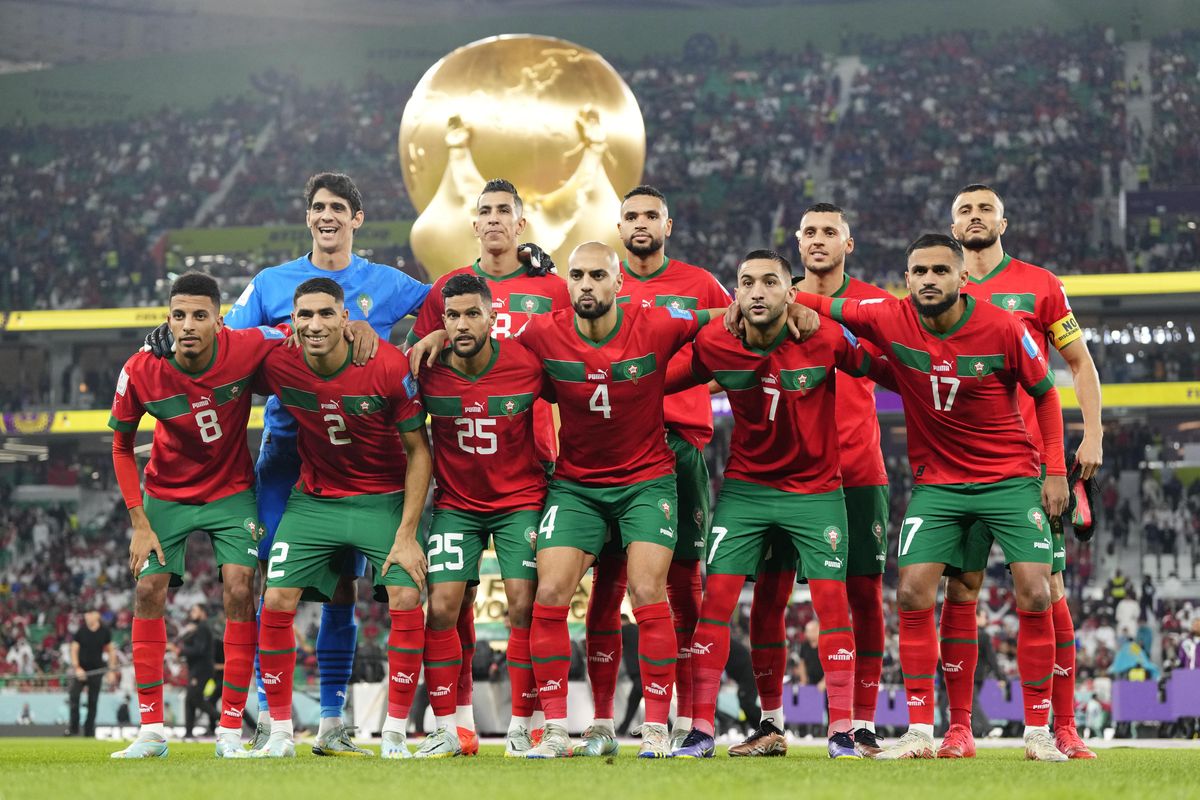Whether or not underdog Morocco beats France in the World Cup semifinals on Wednesday, one thing is sure: Becoming the first African or Arab nation to get this far in the biggest sporting event on the planet stands to get Morocco more than on-field glory in Qatar.
The Atlas Lions probably didn't expect to have such an amazing run, but their overperformance is no coincidence. It’s the fruit of decades of heavy investment by the kingdom in developing its players as part of Morocco’s broader sports diplomacy.
Hold up. What is sports diplomacy? It’s “when the acts of diplomacy — communication, representation, and negotiation — intersect with the sports world, whether it's in the arena or outside of it," says Lindsay Sarah Krasnoff, who knows a thing or two about sports diplomacy because she teaches it at NYU.
It can be formal, when carried out by governments or by an athlete representing a country, or informal — like the privately-run NBA’s push to make basketball a global game. But the objective is always the same: to get your country or sport noticed so you can "sell" it to the world.
Although success in sports ≠ success in politics, it does boost a national brand. A good example is Croatia, a country of less than 4 million that's only been independent for 30 years. Four years ago, it’s often said that France won the World Cup but Croatia won the hearts of fans around the world by making it all the way to the final of the tournament in Russia.
Its fairytale run put Croatia on everyone’s radar. According to one study, during the 2018 tournament visits to the tourism website soared by 250% — a big deal for a nation that makes 20% of its GDP from foreign visitors.
Symbolism matters, too. Kolinda Grabar-Kitarović, Croatia's president at the time, went all in on showing her support for the national team in Russia. She won global praise for traveling in economy class with fans, gifting world leaders with customized jerseys, and braving a downpour to comfort the players after losing to France in Moscow. The president made her country look cool — exactly what you want to promote foreign investment and tourism.
(Unfortunately for Grabar-Kitarović, she became more famous abroad than popular with Croatian voters, narrowly losing re-election in 2020.)
Morocco is the Croatia of 2022. "It's fair to say there will be a marginal soft power benefit for Morocco. Their winning streak has generated a lot of excitement," says Eurasia Group analyst Sofia Meranto. "The Arab world and African spectators are united in backing them, and leaders across the region were quick to express their joy at the team making the semifinals. Many other fans now also see the Atlas Lions as the favored underdog."
The government is eager to cash in on the team's success to get the most bang for its sports diplomacy buck. A clear sign is the slick video from the Moroccan tourism board dominating halftime TV ads during the tournament across Europe.
This is a unique opportunity for Morocco to showcase itself to tourists. Before COVID, the country welcomed almost 20 million of them, with tourism accounting for more than 10% of GDP and 17% of the Moroccan workforce. The sector has recovered, but only at 80% of pre-pandemic levels — so Morocco would certainly appreciate a World Cup bump to get its tourism groove back ... and maybe even further develop its cash cow.
"It's great to make an imprint, but you want to do more than just enter the history books," Krasnoff explains. "You want to sustain that in order to get the maximum mileage out of your investment."
But investing in sports diplomacy can also backfire. Over a decade ago, Qatar not only spent big to secure the right to host the World Cup but also launched BeIN, a global sports channel under the Al-Jazeera network, and purchased French soccer club PSG.
Since then, the Qataris have gotten blowback over the alleged bribes involved in their bid as well as their dodgy human rights record. BeIN has lost the rights to air many top competitions, and traditional European fans have soured on PSG for being nouveau riche. Money might lure mega-stars like Leo Messi to Paris, but it won’t buy the respect of romantics who just love the Beautiful Game.
So, who'll win the sports diplomacy World Cup in 2022? The stakes are very different for the host country and Morocco.
Off the pitch, uber-rich and regional soft power heavyweight Qatar can claim credit for organizing the World Cup that featured the best-ever run for an Arab team. It’s too soon to say whether the tournament put a dent in the country’s global standing or rather delivered precisely what the Qataris hoped for: lots of attention and future partnerships.
But on the pitch, less affluent and influential Morocco has captured the imagination of Arab and non-Arab fans alike — with none of Qatar’s political baggage.






